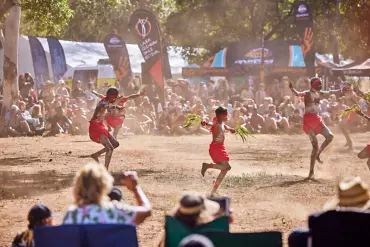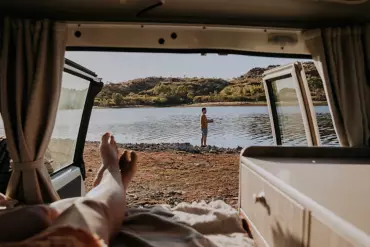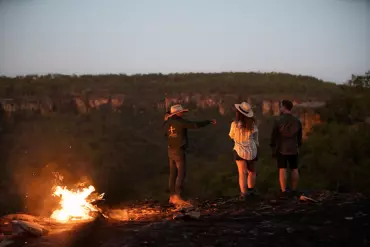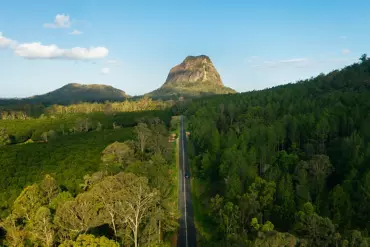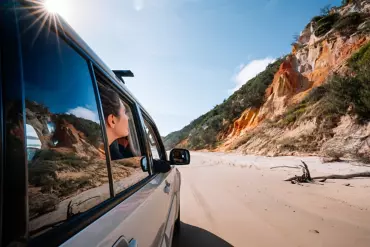Escape the city with this Heron Island and the Gemfields getaway
Itinerary
By Sarah Bristow
See a new side to the Sunshine State with a trip to Heron Island and its nearby gemfields, one of the lesser-known regions of Queensland. Here we’ve mapped out your journey into this unique region, a varied adventure which will see you foray from reef to outback in five days, moseying through the likes of Gladstone, Rockhampton, and Sapphire.
Day one

The iconic long jetty at Heron Island
Morning
Set off on your Heron Island and gemfields adventure, making your way to Gladstone. Brisbane-based? Hit the bitumen and in 500 kilometres time you’ll find yourself in the CBD. Or jump aboard a flight or the tilt train to Rockhampton, which sits just an hour north.
Afternoon
The islands are calling - board the Heron Islander ferry which takes just two hours to reach the coral cay. As you glide through the crystalline waters you’ll be gifted views of the Gladstone Marina and surrounding reef before you reach Heron Island’s iconic long jetty. It won’t take you long to get to know the sandy stretch - it stretches just 800m long and 300m wide.
Evening
Greet your home for the night - the Heron Island Resort. The beachfront retreat has a handful of different options for all budgets, from Turtle Rooms to family-friendly Pool Suites. The ample amenities are also worth a mention, including a day spa and a portfolio of boat tours.
Day Two
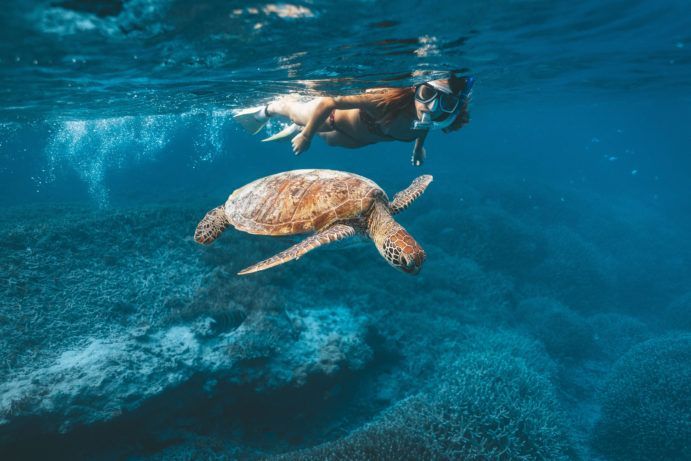
Snorkeling on the reef at Heron Island
Morning
Grab your snorkel and hit the reef. There are 16 dive sites within 15 minutes of the island, with Heron Island considered one of the world’s best options to swim amongst the fish. Just be mindful that you’re best to explore the world underwater at high tide.
Afternoon
Get to know the coral cay on foot with the handful of guided walks and bird watching opportunities for guests to enjoy. And don’t miss out on a chance to visit the University of Queensland’s Heron Island Research Station to learn more about the local environment.
Evening
Indulge in one of Heron Island’s famous sunsets while aboard the resort’s legendary evening cruise. Watch the sun dip below the horizon while you tuck into wine and cheese as you cruise along the calm waters by boat.
Day Three

Exploring the Capricorn caves
Morning
Continue your tour of Heron Island and the Gemfields. It’s today that you’ll be departing the islands for the country’s beef capital of Rockhampton, a fast-growing metropolis on the cusp of the Fitzroy River with a booming collection of eateries among its attractions.
Afternoon
Just 20 kilometres outside of town central you’ll find the Capricorn Caves. The largest privately-owned cave system in Australia is a popular tourist attraction. Clamber the chambers, which come adorned with stalactites, rare ferns, and even bats.
Evening
No visit to Rockhampton is complete without spending an evening by the river. Tuck into a local steak then post-meal, lay your head in the Discovery Holiday Parks, ranging from apartments and to a campground.
Day Four

Fossicking at the Emerald gemfields
Morning
Depart the bovine hotspot for the Central Queensland Highlands, making your way west from Rockhampton along the Capricorn Highway and past its assortment of Outback frontier towns. In three hours (or so) you’ll meet the Emerald and Sapphire Gemfields.
Afternoon
Learn to fossick at Fascination Gems in Rubyvale where the self-drive tour will not only gain you a fossicking licence, but tips from an experienced miner, and all the tools and driving directions needed to begin your sapphire hunting career.
Evening
Spend your night nearby at the conveniently close Rubyvale Gem Gallery Apartments. The collection of self-contained holiday apartments is a family-run affair, and boasts its own cafe, an eatery rather renowned for its homemade scones.
Day Five

Carnarvon National Park and surrounds
Morning
Head underground, spending the morning traversing the depths for 40 minutes with the Miner’s Heritage Walk-in Mine in the Central Queensland Sapphire fields. You’ll be able to get up close and personal with the places in which some of the world’s most famous gems have been discovered.
Afternoon
Take a detour from your gem studies to pay a visit to Carnarvon National Park. Here bushwalking tracks galore mingle with towering sandstone cliffs and gorges, dating back a staggering 20-30 million years and covered in significant Indigenous art.
Get to know the Gladstone region
You may also like

